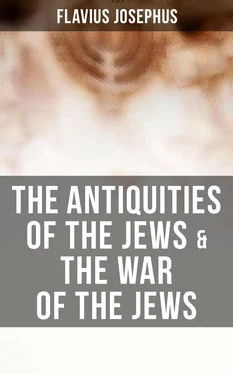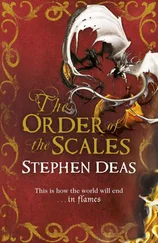3. Now when David had made an expedition against Damascus, and the other parts of Syria, and had brought it all into subjection, and had placed garrisons in the country, and appointed that they should pay tribute, he returned home. He also dedicated to God at Jerusalem the golden quivers, the entire armor which the guards of Hadad used to wear; which Shishak, the king of Egypt, took away when he fought with David's grandson, Rehoboam, with a great deal of other wealth which he carried out of Jerusalem. However, these things will come to be explained in their proper places hereafter. Now as for the king of the Hebrews, he was assisted by God, who gave him great success in his wars, and he made all expedition against the best cities of Hadadezer, Betah and Machen; so he took them by force, and laid them waste. Therein was found a very great quantity of gold and silver, besides that sort of brass which is said to be more valuable than gold; of which brass Solomon made that large vessel which was called The Brazen Sea, and those most curious lavers, when he built the temple for God.
4. But when the king of Hamath was informed of the ill success of Hadadezer, and had heard of the ruin of his army, he was afraid on his own account, and resolved to make a league of friendship and fidelity with David before he should come against him; so he sent to him his son Joram, and professed that he owed him thanks for fighting against Hadadezer, who was his enemy, and made a league with him of mutual assistance and friendship. He also sent him presents, vessels of ancient workmanship, both of gold, of silver, and of brass. So when David had made this league of mutual assistance with Toi, (for that was the name of the king of Hamath,) and had received the presents he sent him, he dismissed his son with that respect which was due on both sides; but then David brought those presents that were sent by him, as also the rest of the gold and silver which he had taken of the cities whom he had conquered, and dedicated them to God. Nor did God give victory and success to him only when he went to the battle himself, and led his own army, but he gave victory to Abishai, the brother of Joab, general of his forces, over the Idumeans, 3and by him to David, when he sent him with an army into Idumea: for Abishai destroyed eighteen thousand of them in the battle; whereupon the king of Israel placed garrisons through all Idumea, and received the tribute of the country, and of every head among them. Now David was in his nature just, and made his determination with regard to truth. He had for the general of his whole army Joab; and he made Jehoshaphat, the son of Ahilud, recorder. He also appointed Zadok, of the family of Phinehas, to be high priest, together with Abiathar, for he was his friend. He also made Seisan the scribe, and committed the command over the guards of his body to Benaiah; the son of Jehoiada. His elder sons were near his body, and had the care of it also.
5. He also called to mind the covenants and the oaths he had made with Jonathan, the son of Saul, and the friendship and affection Jonathan had for him; for besides all the rest of his excellent qualities with which he was endowed, he was also exceeding mindful of such as had at other times bestowed benefits upon him. He therefore gave order that inquiry should be made, whether any of Jonathan's lineage were living, to whom he might make return of that familiar acquaintance which Jonathan had had with him, and for which he was still debtor. And when one of Saul's freed men was brought to him, who was acquainted with those of his family that were still living, he asked him whether he could tell him of any one belonging to Jonathan that was now alive, and capable of a requital of the benefits which he had received from Jonathan. And he said, that a son of his was remaining, whose name was Mephibosheth, but that he was lame of his feet; for that when his nurse heard that the father and grandfather of the child were fallen in the battle, she snatched him up, and fled away, and let him fall from her shoulders, and his feet were lamed. So when he had learned where and by whom he was brought up, he sent messengers to Machir, to the city of Lodebar, for with him was the son of Jonathan brought up, and sent for him to come to him. So when Mephibosheth came to the king, he fell on his face and worshipped him; but David encouraged him, bade him be of good cheer, and expect better times. So he gave him his father's house, and all the estate which his grandfather Saul was in possession of, and bade him come and diet with him at his own table, and never to be absent one day from that table. And when the youth had worshipped him on account of his words and gifts given to him, he called for Ziba, and told him that he had given the youth his father's house, and all Saul's estate. He also ordered that Ziba should cultivate his land, and take care of it, and bring him the profits of all to Jerusalem. Accordingly, David brought him to his table every day, and bestowed upon the youth, Ziba and his sons, who were in number fifteen, and his servants, who were in number twenty. When the king had made these appointments, and Ziba had worshipped him, and promised to do all that he had bidden him, he went his way; so that this son of Jonathan dwelt at Jerusalem, and dieted at the king's table, and had the same care that a son could claim taken of him. He also had himself a son, whom he named Micha.
1Whether Syria Zobah, 2 Samuel 3:8; 1 Chronicles 18:3-8, be Sophene, as Josephus here supposes; which yet Ptolemy places beyond Euphrates, as Dr. Hudson observes here, whereas Zobah was on this side; or whether Josephus was not here guilty of a mistake in his geography; I cannot certainly determine.
2David's reserving only one hundred chariots for himself out of one thousand he had taken from Hadadezer, was most probably in compliance with the law of Moses, which forbade a king of Israel "to multiply horses to himself," Deuteronomy 17:16; one of the principal uses of horses in Judea at that time being for drawing their chariots. See Joshua 12:6; and Antiq. B. V. ch. 1. sect. 18. It deserves here to be remarked, that this Hadad, being a very great king, was conquered by David, whose posterity yet for several generations were called Benhadad, or the son of Hadad, till the days of Hazael, whose son Adar or Ader is also in our Hebrew copy (2 Kings 13:24: written Benhadad, but in Josephus Adad or Adar. And strange it is, that the son of Hazael, said to be such in the same text, and in Josephus, Antiq. B. IX. ch. 8. sect. 7, should still be called the son of Hadad. I would, therefore, here correct our Hebrew copy from Josephus's, which seems to have the true reading, nor does the testimony of Nicolaus of Damascus, produced in this place by Josephus, seem to be faultless, when it says that he was the third of the Hadads, or second of the Benhadads, who besieged Samaria in the days of Ahab. He must rather have been the seventh or eighth, if there were ten in all of that name, as we are assured there were. For this testimony makes all the Hadads or Benhadads of the same line, and to have immediately succeeded one another; whereas Hazael was not of that line, nor is he called Hadad or Benhadad in any copy. And note, that from this Hadad, in the days of David, to the beginning of Hazael, were near two hundred years, according to the exactest chronology of Josephus.
3By this great victory over the Idameans or Edomites, the posterity of Esau, and by the consequent tribute paid by that nation to the Jews, were the prophecies delivered to Rebecca before Jacob and Esau were born, and by old Isaac before his death, that the elder, Esau, (or the Edomites,) should serve and the younger, Jacob, (or the Israelites,) and Jacob (or the Israelites) should be Esau's (or the Edomites') lord, remarkably fulfilled. See Antiq. B. VIII. ch 7. sect. 6; Genesis 25;9,3; and the notes on Antiq. B. I. ch. 18. sect. 5, 6.
Читать дальше












